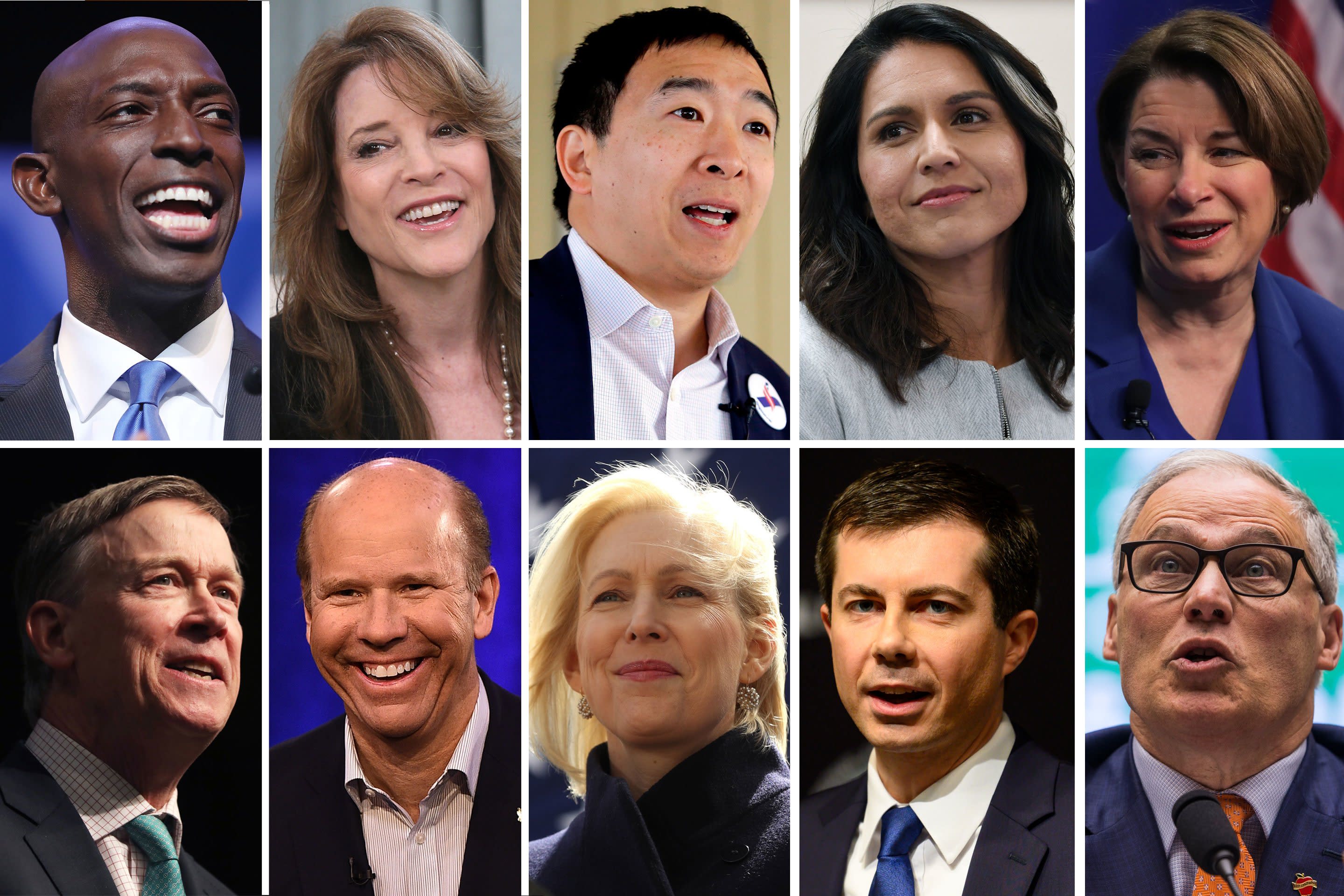Democratic Primary Candidates
The 2024 Democratic Party presidential primaries and caucuses will begin on January 27, 2024, with the Iowa caucuses. The Democratic National Convention will be held in Milwaukee, Wisconsin, from July 13 to 16, 2024.
The following is a list of candidates who have declared their candidacy for the Democratic nomination:
- Joe Biden, 79, incumbent President of the United States, former Vice President of the United States, and former U.S. Senator from Delaware.
- Cory Booker, 53, U.S. Senator from New Jersey and former mayor of Newark, New Jersey.
- Pete Buttigieg, 39, former mayor of South Bend, Indiana, and former Democratic presidential candidate in 2020.
- Kamala Harris, 58, U.S. Senator from California and former Attorney General of California.
- Roy Cooper, 65, Governor of North Carolina and former Attorney General of North Carolina.
- Andrew Cuomo, 64, former Governor of New York.
- Jay Inslee, 70, Governor of Washington and former U.S. Representative from Washington.
- Amy Klobuchar, 61, U.S. Senator from Minnesota.
- Beto O’Rourke, 49, former U.S. Representative from Texas and former Democratic presidential candidate in 2020.
- Bernie Sanders, 80, U.S. Senator from Vermont and former Democratic presidential candidate in 2016 and 2020.
- Elizabeth Warren, 72, U.S. Senator from Massachusetts and former Democratic presidential candidate in 2020.
Key Issues in the Democratic Primary

The Democratic primary campaign is heating up, with candidates vying to earn the party’s nomination for president. Several key issues are shaping the race, from healthcare to climate change to economic inequality.
The candidates have put forth a wide range of policy proposals on these issues, reflecting the diversity of perspectives within the Democratic Party. Here’s a closer look at some of the most important issues in the Democratic primary:
Healthcare
- Medicare for All: This proposal would create a single-payer healthcare system in the United States, eliminating private health insurance and replacing it with a government-run plan.
- Public Option: This proposal would create a public health insurance option that would compete with private insurers on the Affordable Care Act exchanges.
- Lowering Drug Prices: This proposal would allow the government to negotiate lower drug prices with pharmaceutical companies.
Climate Change
- Green New Deal: This proposal would invest heavily in clean energy and infrastructure, with the goal of reducing greenhouse gas emissions and creating jobs.
- Carbon Tax: This proposal would tax carbon emissions, making it more expensive for companies to pollute.
- Clean Energy Standard: This proposal would require utilities to generate a certain percentage of their electricity from renewable sources.
Economic Inequality
- Raising the Minimum Wage: This proposal would increase the federal minimum wage to $15 per hour.
- Universal Basic Income: This proposal would provide every American with a regular cash payment, regardless of their employment status.
- Wealth Tax: This proposal would tax the wealth of the richest Americans.
Education, Democratic primary
- Free College Tuition: This proposal would make public college tuition-free for all students.
- Student Loan Forgiveness: This proposal would forgive all or a portion of student loan debt for borrowers.
- Expanding Early Childhood Education: This proposal would invest in early childhood education programs, such as Head Start.
Immigration
- Path to Citizenship: This proposal would create a pathway to citizenship for undocumented immigrants who meet certain requirements.
- Increased Border Security: This proposal would increase funding for border security measures, such as building a wall along the U.S.-Mexico border.
- Family Reunification: This proposal would prioritize the reunification of families who have been separated at the border.
Primary Election Process: Democratic Primary
The Democratic primary elections are a series of elections held in each U.S. state and territory to select delegates to the Democratic National Convention, which nominates the party’s presidential candidate. The primary election process begins with the Iowa caucuses in early February and ends with the final primaries in June.
The different methods of voting in the primaries include caucuses and open primaries. Caucuses are meetings where voters gather to discuss and vote for their preferred candidate. Open primaries allow any registered voter to vote in the primary, regardless of their party affiliation.
Delegates and Superdelegates
Delegates are individuals who are elected to represent their state or territory at the Democratic National Convention. The number of delegates each state receives is based on its population and the results of the previous presidential election. Superdelegates are party leaders and elected officials who are also delegates to the Democratic National Convention. Superdelegates are not bound to vote for the candidate who wins the popular vote in their state or territory.
Timeline of Key Dates
– February 1: Iowa caucuses
– February 11: New Hampshire primary
– February 19: Nevada caucuses
– February 25: South Carolina primary
– March 3: Super Tuesday (14 states and one territory vote)
– June 6: Last primary (New Jersey and California)
– July 17-20: Democratic National Convention
